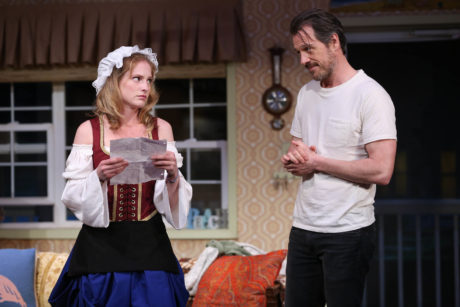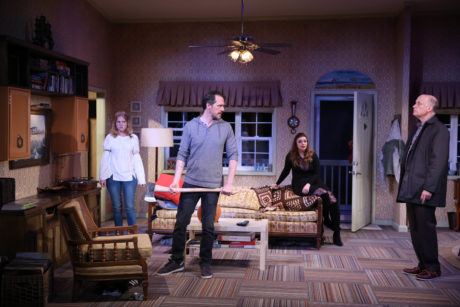“I’ve made bad choices. And I’ve made them . . . knowingly,” says 27-year-old Tanya – a single mom and bar waitress in a South Jersey beach town – in the opening scene of Gina Gionfriddo’s latest dark comedy at Vineyard Theatre, Can You Forgive Her? Inspired in part by the socio-economic dilemmas faced by the women in English author Anthony Trollope’s eponymous Victorian novel of 1864-65, Gionfriddo’s present-day characters deal with similar issues of romance and finance, the lingering impact of a dysfunctional family, and their habitual ineptitude in making sound decisions. Directed by Peter DuBois, the tone of the play lies halfway between overblown TV sit-com and absurdist satire, with convoluted plot points, unlikely conversations, and unlikeable stereotypes that are less amusing or engaging than they are exaggerated and aggravating, yet at the same time innately familiar, as they wrestle ineffectually with the driving forces of money and status, and the psychology of self-esteem and self-delusion, in our capitalist culture.

Would hard-working self-help-spouting Tanya really send her ill-matched unemployed 40-year-old fiancé Graham home alone from the bar on Halloween night with the unknown Miranda, dressed in a sexy black witch’s outfit, to save her from Sateesh, a date she believes wants to kill her? Would the entitled Miranda, who has two degrees and $200,000 of debt from the prestigious high-tuition schools she attended, not comprehend that she’s a prostitute if she dates one man for the expensive gifts he gives her and has sex-for-pay twice a week with David, a much older and emotionally-distant doctor? Would both women really be attracted to the irresponsible underachiever Graham, who, six months after his mother’s death, still hasn’t dealt with her dilapidated beach house where they all converge, or read her unpublished writings, stacked up in cardboard boxes in the kitchen? Would this quirky group really pour out their hearts, divulge their pasts, and expound their philosophies of life to each other in real time? They do here! And in so doing, they return to the question posed by Trollope in the 19th century: “What should a woman do with her life?” Not any of this.

The cast is unsympathetic in its characterizations of the unappealing and profoundly-flawed personalities, all selfish, stuck, unhappy, and self-destructive in their own way. Amber Tamblyn, making her New York stage debut, stars as Miranda; she is self-indulgent, angry, and aggressive, denying her poverty and prostitution, then pathetic in her reactions to the humiliating responses she receives from the three men. Ella Dershowitz as the ethically-superior Tanya is determined to work for a better life with the money she raises as “a serving wench” and the principles she quotes with full-out credulity from the back cover of a self-improvement manual, intent on foisting her unwanted advice about lifestyles, livelihood, and doing the right thing on the others, and laughably optimistic that her intended will follow it (or is their engagement yet another bad choice?). Darren Pettie’s unmotivated Graham just goes with the flow (“there’s the examined life and then there’s the anesthetized life,” he notes), serving up unlimited drinks to the odd assemblage and telling the women what they want to hear, until he is finally pushed into momentary bursts of action. Rounding out the ensemble is Frank Wood as Miranda’s sugar-daddy, who extols his philanthropic gifts to the children of the world but remains cold-hearted to both his family and his mistress, and, in his fifties, still whines about the disappointments of his childhood; and Eshan Bay as the would-be killer Sateesh, who at last appears, knife in hand, in the surprising climactic scene at the house.
Costumes by Jessica Pabst serve to define the personalities, with Halloween outfits figuring prominently in the story, as does an old album by The Mama’s and The Papa’s, left to Graham by his mother and played by him at revelatory points in the narrative (sound design by Daniel Kluger). Allen Moyer’s set captures the look of an outdated ‘70s-style house at the shore, with views of the neighborhood and telling glimpses of the characters through the screen door and windows. Russell Champa’s lighting creates a spooky mood with the blackness that envelops two carved jack-o’-lanterns that are “more ghoulish than cute,” the final scary confrontation with Sateesh, and the ultimate darkness in the writings of Graham’s mother.
In response to the rhetorical question posed in the title of Can You Forgive Her?, the answer is a resounding no. It’s hard to forgive, to laugh at, or to care about any of these irritating characters. And maybe that’s Gionfriddo’s point; if you can’t, then don’t behave like them.
Running Time: Approximately one hour and 35 minutes, without an intermission.
Can You Forgive Her? plays through Sunday, June 11, 2017, at Vineyard Theatre – 108 East 15th Street, NYC. For tickets, call (212) 353-0303, or purchase them online.





